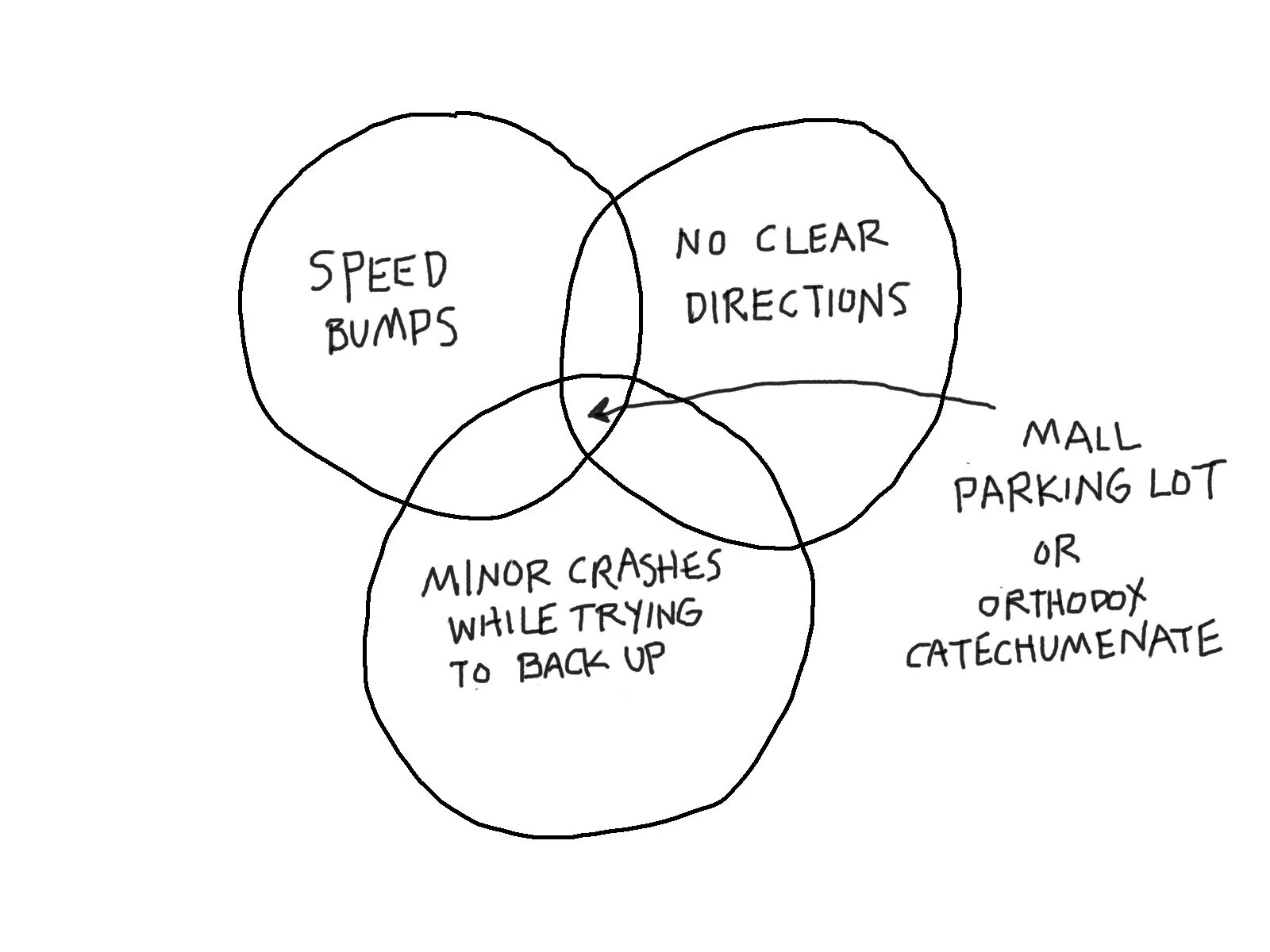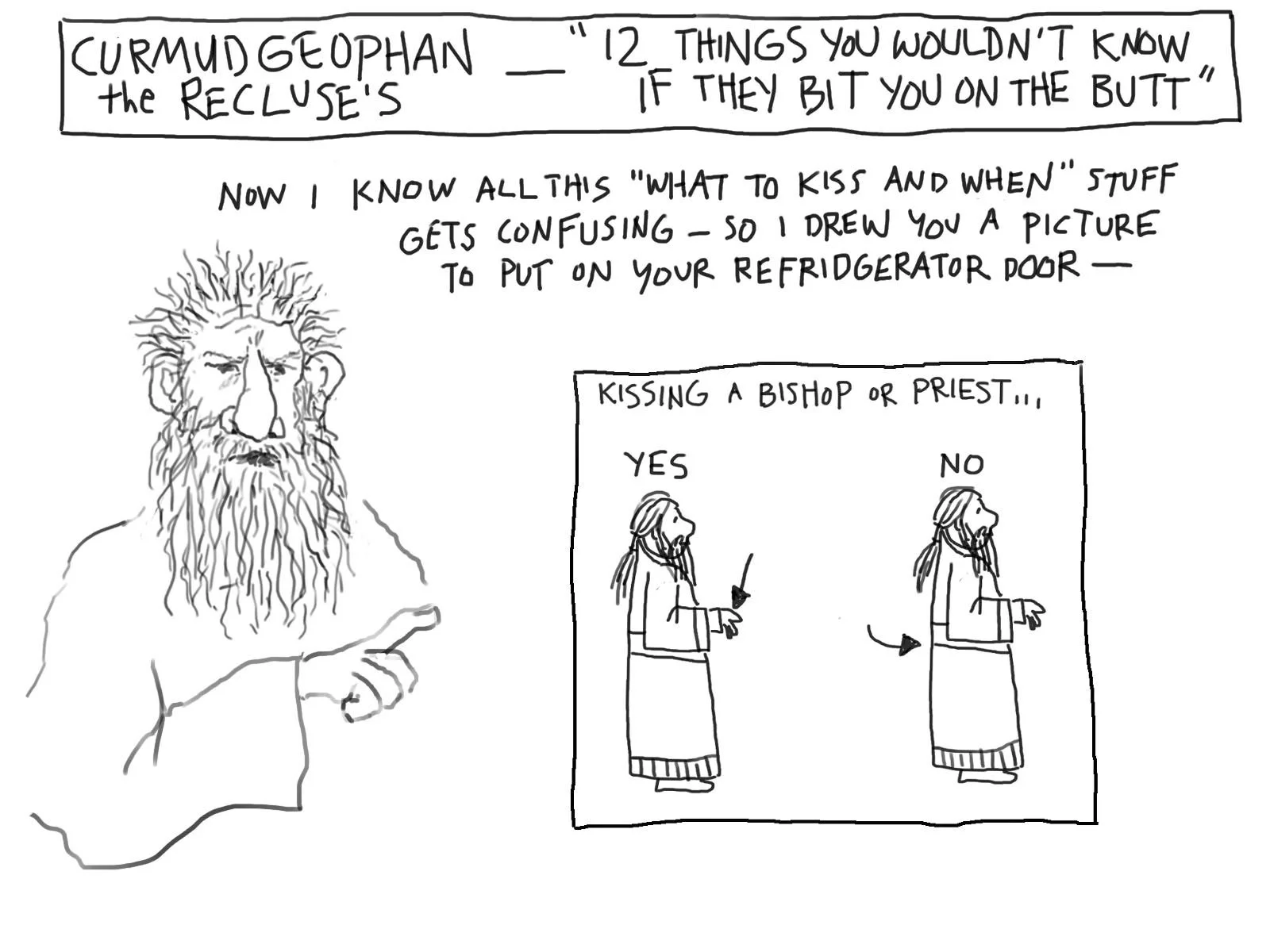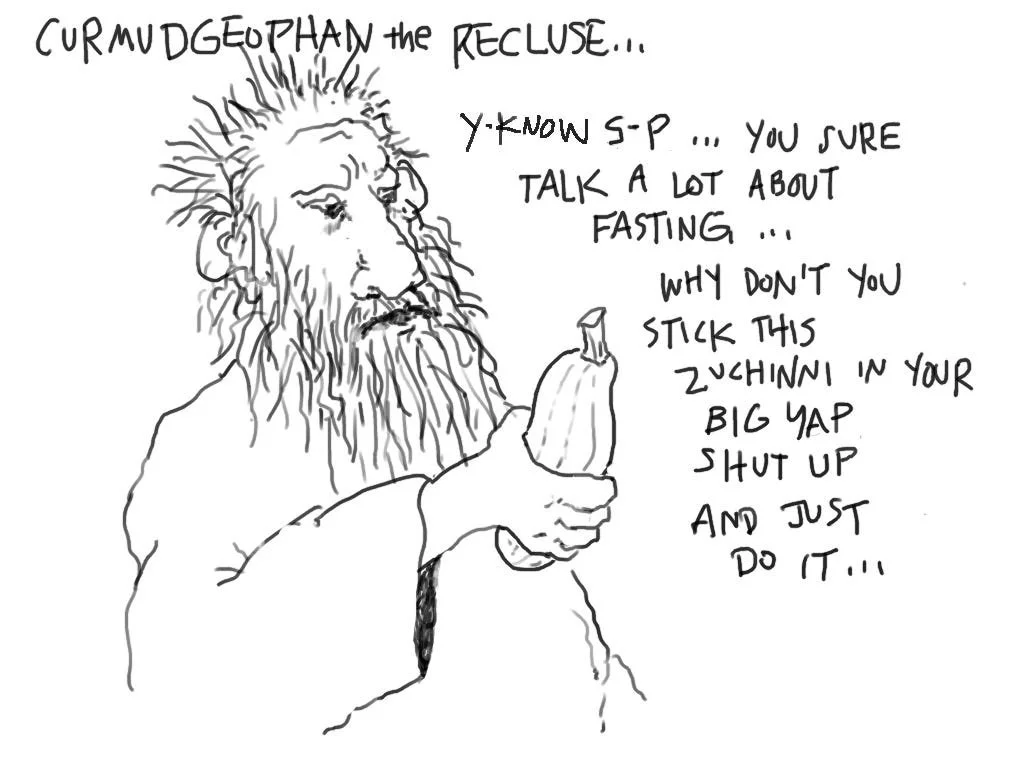Becoming Orthodox, Staying Orthodox
STEVE ROBINSON
It has been about 32 years since I discovered Vladimir Lossky’s book The Mystical Theology of the Eastern Church in my Episcopal Church’s library (it had been checked out only once in the preceding decades). The day I finished the first chapter I was hooked. Since then, I have been in the trenches of what we might call “online convert Orthodoxy.” I started in Yahoo chat rooms, then became an Orthodox live radio-show broadcaster, blogger, podcaster, author, commenter in Facebook groups, and catechist/evangelist in mission parishes. I believe I have both done and seen virtually every zealous, sincere, immature, overboard, and fearful, hesitant, confused thing that people think and do when coming into the church and navigating the dissonance of its lived reality versus our internet-curated expectations.
I’m now observing the current tidal wave of inquirers flowing into, and sometimes overflowing, parishes. My current parish averages 50-plus catechumens at any one time. I know this surge will challenge the abilities and resources of our pastor and our community to adopt them into our family, and to help them manage their expectations and reactions to the encountered realities of American Orthodox parish life.
Like many of the inquirers who walk through the doors of the church, I had been “catechized” for years on the internet before I ever attended a service. When I finally showed up the first time for Vespers at an ethnic Greek Cathedral parish, I was already intellectually converted, and I had even been “evangelizing” online.
I was unprepared for what I encountered. There was a chanter, one person in the “congregation,” and the priest—and the three of us visitors sitting in a pew toward the back of the chapel. And as I would find out later, the lone parishioner was the chanter’s girlfriend. My reaction was a mixture of confusion, disappointment, and, yes, judgment and condemnation. This was an 800-family parish, after all. But I had no clue that this reaction would characterize what I’d be dealing with, both personally and in my relationships with other inquirers, for the next 26 years.
Like everyone who comes to the church “already catechized,” I did not know that internet Orthodoxy is like reading online dating profiles and looking at carefully chosen and Photoshopped pictures. The personality, habits, disposition, attractiveness, and compatibility of my new theological lover were fantasies I had constructed. Of course. I had never talked to her, never gone out on a date and encountered her in person. Everything I knew was hearsay. I had never shared a meal with her, known her relatives (many of them from foreign countries), accommodated her idiosyncrasies, learned her language, or sat in prolonged silence with her.
When I showed up at Vespers unannounced, I caught the reality of Orthodoxy in its tattered bathrobe and house slippers, smoking an unfiltered Camel with a Mason jar of cheap chardonnay in her hand. (Incidentally, one of my catechetical experiences later would be helping with a mission parish where the priest would go outside during the long chanter’s parts of Orthros/Matins and smoke in the parking lot.) I repressed my disappointment with what I found, because disappointment was the only emotion I felt. Even in that nearly empty Vespers service, there was an ineffable, irresistible, unexpected beauty, which no description, dogma, testimonial, or digital experience could have given me.
So, like many who come to the Church via the internet, I had found the Church—and eventually, became Orthodox—for the beauty it promised. And, yes, the beauty existed as advertised. As did the mind-boggling theological nuances, the profound spiritual direction, and the rich liturgical depth. But, unlike the internet, real people with real spiritual lives and real issues also existed in it—and I could not delete, unfriend, or fire insulting comments over their digital heads and go to bed with “likes” and a smirk at my correctness and cleverness. When you sit across from someone at coffee hour, the rules of the game are incarnational, not digital, and they’re far more complicated.
The reason is that the Church is made up of people. Lots of them. Each in “the hospital for sinners” with pre-existing conditions. I hoped for saints, but over the years I found the church of Corinthian libertines and Cretan gluttons. I hoped for one uniform understanding of the Gospel of mercy, but instead found legalistic, fundamentalist Galatians who viewed the Gospel as “law.” I hoped for the unity of the Spirit in the bond of peace but found Timothean contentious schismatics who wrangled over words to create factions in the church. I hoped for humble pious clergy but found 3rd John clerics who loved their pre-eminence and respectful greetings in the marketplace. I hoped for the unspotted bride of Christ but found the seven churches of Revelation: Ephesians who had left their first love, pagan Pergamites, lukewarm Laodiceans. I hoped for a church with one mind but found nit-picking Pharisees and savvy Sadducees. I hoped for speaking the truth in love but found arrogant, angry, condescending apologists. I hoped for pure Christianity and found syncretistic and superstitious Colossians.
I expected to find charismatic, monastic bishops who “rightly divided the word of truth,” but I found flawed men in gold robes who often did not divide it according to the truth as I understood it from Orthodox websites and discussion forums. I found that bishops’ decisions for my jurisdiction trumped the Canons as interpreted by bishops in other jurisdictions, Facebook groups, and YouTube clerics with cult followings (or at least that was the bishops’ intent).
I hoped to find that the bishops’ and synod’s administration of the Church resembled the way I managed my own business: with transparency, timely decisiveness, clarity in communication, and with no respect of persons. But… well…
I hoped to find clerics and a parish life that fit my understanding of competent, pastoral, wise church leadership and ministry, but it never occurred to me that my expectations were filtered through my American fundamentalist, congregationalist Bible Church culture and experience. I soon found I had to figure out how to live in a clerical leadership paradigm of a Middle Eastern culture that was explained to me as “God is an Arab sheik, and the priests are his princes.” And it was not received well when I asked, “where is this in Scripture?”
Well… you get it. In short, after spending six years reading books, surfing the web, and chatting online, I didn’t get it. At all. I was a spiritual adolescent raised by the wolves of the internet (and in many things was still an infant). I thought I was more mature than I was and thought I knew more than I did. I knew how to live in my head but not how to live in a real, big world I’d never had to navigate. I “knew” almost everything, judged almost everyone, and understood almost nothing. I knew book and internet intellectual Orthodoxy. I had no clue about 2,000 years of culturally informed, persecuted, martyred, and Old Country theocratically “lived Orthodoxy.”
Once I was “in,” I soon found that my bishop, priest, and fellow parishioners didn’t care about my opinions, prognostications, and interpretations of the Canons and “The Fathers,” nor about my views on who should be ordained, defrocked, commemorated, or regarded as a saint or a heretic. They were unimpressed with my keeping the visible spiritual disciplines, as I was unimpressed by their lack of observance.
So, intellectually I understood that the Church was still in existence dogmatically and practically. And I kind of knew the Church of Acts 28 was not identical to the Church of Acts 2, just as the Church of 2024 was not identical to the Church of Acts 28. To be Orthodox, one must accept that the Holy Spirit has guided the changes in the Church (from structure, to liturgy, to Canons, to vestments, to clerical offices, to non-dogmatic doctrines, prayers, fasting rules, and so on) from Acts 2 to the present day. Even through the messy parts of the story. And when you really understand Church history, you know there’s about as much messiness as there is holiness. Contrary to my old Bible church’s teachings, New Testament Christianity didn’t have to be re-discovered, recovered, or restored to its minimalistic First Century purity. It has always existed.
I eventually came to accept that the Church has both an unbroken apostolic succession and an unbroken succession of broken sinners. Both within the clergy and laity. The presence of Christ Himself in the flesh, His twelve first-hand witnesses, and the 70 disciples empowered by the Holy Spirit all leave us with a pretty ragged picture of the Church in the New Testament, and 2,000 years of tradition have not changed that. Church history only affirms and puts an exclamation point on the picture of the Church we see in the Epistles.
That is good news and bad news—but not really bad news, just real news.
What does all this mean for the new inquirer, catechumen, and convert? And perhaps more important, what does this mean for a given priest and his parish as they receive newcomers? Because no one becomes Orthodox online, any more than watching weddings on YouTube can make you married. That only happens in real life with real people in real relationships. And it’s hard.
For the inquirers and catechumens, I think this message is clear: the Church will not be what you expect. You will be both astounded and disappointed at what you find. The more you think you know, the more you don’t know, and the more trouble you might have engaging what is “real” that is in front of you. Find someone to talk to who doesn’t speak in memes and platitudes about the Church and Orthodox life. It may not be someone in a black robe. Find someone older who has been there for decades, not years, and has won wisdom the hard way, not just from books.
It has been my experience with hundreds of converts, in person and online, for nearly 30 years, that the faster and harder someone runs at the Church, the more likely they will soon run through the Church and out the other side—instead of slowing down to humbly engage in the church’s life, via Her flawed and imperfect people.
To the Church and its leadership (including lay leaders), I’d say there is nothing new under the sun. People have flowed in and out of the Church for over 2,000 years, for various reasons and under various influences, in all cultures. Some stay and become saints and some do not. Don’t be fooled by zeal, piety, or knowledge. If someone is pushing to “be saved” (especially by their own preferred method) it might be a red flag that there’s more going on than just love for Christ and His Church.
Someone recently asked me, “How are we going to keep all these young men in the Church?”
I told them, “By love. If they have not been in your homes, at your tables, and haven’t learned they can call you and trust you with anything, they are a flight risk. There has to be a reason above knowledge for them to stay in the Church. And that reason only comes through a personal relationship with people who love them.”
Now, go love some inquirers.



